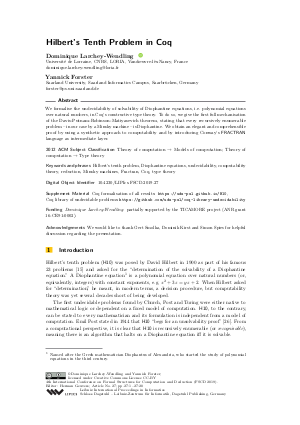Hilbert’s Tenth Problem in Coq
Authors
Dominique Larchey-Wendling  ,
Yannick Forster
,
Yannick Forster
-
Part of:
Volume:
4th International Conference on Formal Structures for Computation and Deduction (FSCD 2019)
Part of: Series: Leibniz International Proceedings in Informatics (LIPIcs)
Part of: Conference: Formal Structures for Computation and Deduction (FSCD) - License:
 Creative Commons Attribution 3.0 Unported license
Creative Commons Attribution 3.0 Unported license
- Publication Date: 2019-06-18
File

PDF
LIPIcs.FSCD.2019.27.pdf
- Filesize: 0.59 MB
- 20 pages
Document Identifiers
Subject Classification
ACM Subject Classification
- Theory of computation → Models of computation
- Theory of computation → Type theory
Keywords
- Hilbert’s tenth problem
- Diophantine equations
- undecidability
- computability theory
- reduction
- Minsky machines
- Fractran
- Coq
- type theory
Metrics
- Access Statistics
-
Total Accesses (updated on a weekly basis)
0Document
0Metadata
Abstract
We formalise the undecidability of solvability of Diophantine equations, i.e. polynomial equations over natural numbers, in Coq’s constructive type theory. To do so, we give the first full mechanisation of the Davis-Putnam-Robinson-Matiyasevich theorem, stating that every recursively enumerable problem - in our case by a Minsky machine - is Diophantine. We obtain an elegant and comprehensible proof by using a synthetic approach to computability and by introducing Conway’s FRACTRAN language as intermediate layer.
Cite As Get BibTex
Dominique Larchey-Wendling and Yannick Forster. Hilbert’s Tenth Problem in Coq. In 4th International Conference on Formal Structures for Computation and Deduction (FSCD 2019). Leibniz International Proceedings in Informatics (LIPIcs), Volume 131, pp. 27:1-27:20, Schloss Dagstuhl – Leibniz-Zentrum für Informatik (2019)
https://doi.org/10.4230/LIPIcs.FSCD.2019.27
BibTex
@InProceedings{larcheywendling_et_al:LIPIcs.FSCD.2019.27,
author = {Larchey-Wendling, Dominique and Forster, Yannick},
title = {{Hilbert’s Tenth Problem in Coq}},
booktitle = {4th International Conference on Formal Structures for Computation and Deduction (FSCD 2019)},
pages = {27:1--27:20},
series = {Leibniz International Proceedings in Informatics (LIPIcs)},
ISBN = {978-3-95977-107-8},
ISSN = {1868-8969},
year = {2019},
volume = {131},
editor = {Geuvers, Herman},
publisher = {Schloss Dagstuhl -- Leibniz-Zentrum f{\"u}r Informatik},
address = {Dagstuhl, Germany},
URL = {https://drops.dagstuhl.de/entities/document/10.4230/LIPIcs.FSCD.2019.27},
URN = {urn:nbn:de:0030-drops-105342},
doi = {10.4230/LIPIcs.FSCD.2019.27},
annote = {Keywords: Hilbert’s tenth problem, Diophantine equations, undecidability, computability theory, reduction, Minsky machines, Fractran, Coq, type theory}
}
Author Details
Funding
- Larchey-Wendling, Dominique: partially supported by the https://ticamore.logic.at/ project (http://www.agence-nationale-recherche.fr/?Projet=ANR-16-CE91-0002).
Acknowledgements
We would like to thank Gert Smolka, Dominik Kirst and Simon Spies for helpful discussion regarding the presentation.
Supplementary Materials
- Coq formalisation of all results: https://uds-psl.github.io/H10, Coq library of undecidable problems: https://github.com/uds-psl/coq-library-undecidability
References
- Mario Carneiro. A Lean formalization of Matiyasevič’s theorem, 2018. URL: http://arxiv.org/abs/1802.01795.
-
John H. Conway. FRACTRAN: A Simple Universal Programming Language for Arithmetic, pages 4-26. Springer New York, New York, NY, 1987.

-
Martin Davis. Arithmetical problems and recursively enumerable predicates 1. The Journal of Symbolic Logic, 18(1):33-41, 1953.

-
Martin Davis. Hilbert’s Tenth Problem is Unsolvable. The American Mathematical Monthly, 80(3):233-269, 1973.

-
Martin Davis and Hilary Putnam. A computational proof procedure; Axioms for number theory; Research on Hilbert’s Tenth Problem. Air Force Office of Scientific Research, Air Research and Development, 1959.

-
Martin Davis, Hilary Putnam, and Julia Robinson. The decision problem for exponential Diophantine equations. Annals of Mathematics, pages 425-436, 1961.

-
Andrej Dudenhefner and Jakob Rehof. A Simpler Undecidability Proof for System F Inhabitation. TYPES 2018, 2018.

-
Yannick Forster, Edith Heiter, and Gert Smolka. Verification of PCP-Related Computational Reductions in Coq. In ITP 2018, pages 253-269. Springer, 2018.

-
Yannick Forster, Dominik Kirst, and Gert Smolka. On Synthetic Undecidability in Coq, with an Application to the Entscheidungsproblem. In CPP 2019, pages 38-51, 2019.

-
Yannick Forster and Dominique Larchey-Wendling. Towards a library of formalised undecidable problems in Coq: The undecidability of intuitionistic linear logic. Workshop on Syntax and Semantics of Low-level Languages, Oxford, 2018.

- Yannick Forster and Dominique Larchey-Wendling. Certified Undecidability of Intuitionistic Linear Logic via Binary Stack Machines and Minsky Machines. In CPP 2019, pages 104-117. ACM, 2019. URL: http://dx.doi.org/10.1145/3293880.3294096.
-
Yannick Forster and Gert Smolka. Weak Call-By-Value Lambda Calculus as a Model of Computation in Coq. In ITP 2018, pages 189-206. Springer, 2017.

-
Kurt Gödel. Über formal unentscheidbare Sätze der Principia Mathematica und verwandter Systeme I. Monatshefte für mathematik und physik, 38(1):173-198, 1931.

-
Warren D. Goldfarb. The undecidability of the secondorder unification problem. Theoretical Computer Science, 13:225-230, 1981.

-
David Hilbert. Mathematical problems. Bulletin of the American Mathematical Society, 8(10):437-479, 1902.

- J. P. Jones and Y. V. Matijasevič. Register Machine Proof of the Theorem on Exponential Diophantine Representation of Enumerable Sets. J. Symb. Log., 49(3):818-829, 1984. URL: http://dx.doi.org/10.2307/2274135.
-
Dominique Larchey-Wendling. Typing Total Recursive Functions in Coq. In ITP 2017, pages 371-388. Springer, 2017.

-
Edouard Lucas. Théorie des Fonctions Numériques Simplement Périodiques. [Continued]. American Journal of Mathematics, 1(3):197-240, 1878.

-
Yuri V. Matijasevič. Enumerable sets are Diophantine. In Soviet Mathematics: Doklady, volume 11, pages 354-357, 1970.

-
Yuri V. Matiyasevich. A new technique for obtaining Diophantine representations via elimination of bounded universal quantifiers. J. Math. Sci., 87(1):3228-3233, 1997.

- Yuri V. Matiyasevich. On Hilbert’s Tenth Problem. Expository Lectures 1, Pacific Institute for the Mathematical Sciences, University of Calgary, February 2000. URL: http://www.mathtube.org/sites/default/files/lecture-notes/Matiyasevich.pdf.
-
Yuri V. Matiyasevich. Martin Davis and Hilbert’s Tenth Problem. In Martin Davis on Computability, Computational Logic, and Mathematical Foundations. Springer, 2016.

-
Marvin L. Minsky. Computation: finite and infinite machines. Prentice-Hall, Inc., 1967.

-
Karol Pąk. The Matiyasevich Theorem. Preliminaries. Formalized Mathematics, 25(4):315-322, 2017.

-
Karol Pąk. Diophantine sets. Preliminaries. Formalized Mathematics, 26(1):81-90, 2018.

-
Emil L. Post. Recursively enumerable sets of positive integers and their decision problems. bulletin of the American Mathematical Society, 50(5):284-316, 1944.

-
Julia Robinson. Existential definability in arithmetic. Transactions of the American Mathematical Society, 72(3):437-449, 1952.

- Benedikt Stock et al. Hilbert Meets Isabelle: Formalisation of the DPRM Theorem in Isabelle. Isabelle Workshop 2018, 2018. URL: http://dx.doi.org/10.29007/3q4s.
- The Coq Proof Assistant. http://coq.inria.fr, 2019.
